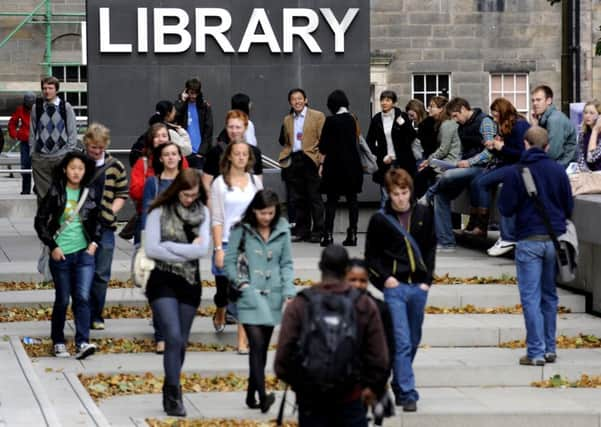Claudia Cavaluzzo: Without input from EU students and staff, we’d live in a much poorer country


This is now a topic of any conversation with friends, family and colleagues (at least for me) to discuss what consequences Brexit will have on immigration and how that might impact on the Scottish economy.
Many seem completely unaware of the undisputable figures behind the economic case for encouraging international students to come to Scotland.
Advertisement
Hide AdAdvertisement
Hide AdA comprehensive report published by the Scottish Government highlights the economic benefits that each international student brings to Scotland. [See Scottish Government response to the Migration Advisory Committee’s consultation on the impact of international students in the UK].


Interestingly, it is calculated that the average EU citizen in Scotland adds £31,400 to the government revenue and £34,400 to the GDP (including post-study contribution).
Moreover, a report published by Universities Scotland highlighted the value of overseas students studying in Scotland. It stated that the economic benefit of attracting international students to Scotland is evidenced by the fact that they provide an estimated £337 million every year in fees and an estimated £441m in off-campus expenditure – renting accommodation, buying the necessities of everyday life etc. In other words, making their home in Scotland for the period of their studies. Further economic benefits come when the student decides to move on to a positive destination (work or further study).
It goes on to point out that these overseas students also have a profound social, cultural and educational impact on Scotland, something which is to be applauded.
Indeed, I talk from experience. I am a prime example of that.
When studying for my PhD at the Katholieke Universiteit of Leuven in Belgium, I saw an opportunity for a collaborative project with the University of Edinburgh, which took me to spend three months in one of the best Schools of Chemistry in Europe. The work carried out in Edinburgh had a great impact in the research on effective anti-HIV drugs, the subject of my PhD thesis.
The time in Scotland has had a profound effect on my career which I decided to continue here and be part of such a vibrant and welcoming society.
To this list of beneficial influences, I would like to add the positive impact being made in the shape of business creation. We are seeing a steady number of companies being started by students and staff who have come from aboard to study and work in Scotland and who are seizing the opportunity offered by initiatives such as the Converge Challenge.
Advertisement
Hide AdAdvertisement
Hide AdAt Converge Challenge, Scotland’s Company Creation Programme, an average of 25% of the total number of applications come from EU staff, students or recent graduates. Converge Challenge helps create companies emerging from the outstanding research and enterprising activities of our Higher Education Institutions.
In the last eight years, Converge Challenge has supported the creation of circa 120 companies. Together, these companies have raised more than £79m and employed over 300 staff, just in Scotland. The likes of Drone Deploy, Cyan Forensics and MindMate are perfect examples of those exciting and high-growth businesses which Converge Challenge has contributed to.
Now, imagine a scenario of these number sitting 25 per cent lower. It’s unthinkable really, but an ever-present reality that this will be the case.
Without the contribution and efforts from EU staff and students, Scotland would have lost 30 companies and at least 75 jobs.
Perhaps Patrick Renner, Roger Arellano and Susanne Mitschke would have never come together to found MindMate, now recognised as one of the fastest growing UK businesses. MindMate combines brain games, healthy nutrition, regular exercise and social interaction to guide Alzheimer’s sufferers towards a lifestyle change that may help curtail some of the effects of cognitive decline. MindMate app has been ranked #1 health app in Apple’s App Store in 17 countries.
More importantly, an intervention-based study for early onset Alzheimer patients conducted by the University of Glasgow showed that subjects who used MindMate are more independent in their daily lives and even improved cognitive abilities.
Entrepreneurship should have no barriers and therefore I hope that Scotland, a dynamic, warm, entrepreneurial and outward looking country, will find a way to continue to attract the best and brightest students whose contribution to the economy and society is so precious.
Claudia Cavaluzzo, Director, Converge Challenge.